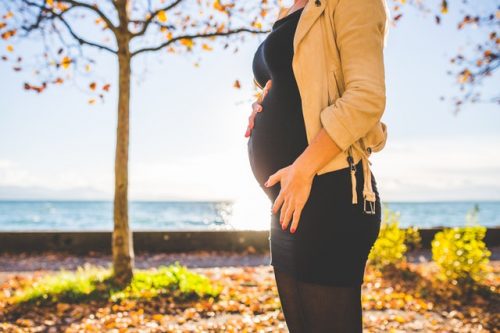I was precisely four weeks into childbearing when I learned about it. My boyfriend as well as me did not expect or plan it since we had only been together for a year. However, he promised that he would care for me and my health and be an excellent partner as well as a father, so all my worries ebbed away.
Unfortunately, before the end of my first trimester, I received an email from an unknown sender. Its subject read: “YOU NEED TO SEE THIS.” I was not the type to open such emails for fear of getting spammed, but I did not know what got to me that day, so I opened it. It was from a girl named Marla, who claimed to be my boyfriend’s wife. She said that he stopped coming home one day, and she begged me to return him to her and their three kids.

I could not cry instantly, especially when I scrolled further down and saw my boyfriend’s face in all the pictures that Marla had attached. I had no idea what to do next, but I knew one thing: I did not want my boyfriend in my life or my baby’s life. I threw away his clothes from my apartment that night and told him what I had learned about his civil status. He tried to explain, but I refused to listen to his excuses.
At the time, no one else knew about my pregnancy. My belly was not showing yet either, so even my coworkers were unaware of it. To lessen my emotional pain, I decided to take double shifts at work and barely eat. It was my way of coping with the depression that followed my breakup. And when I wasn’t working, I was crying for the wasted love I gave my ex.
I soon realized that it was the worst coping mechanism, considering I experienced spotting and almost lost my baby during my pregnany journey. My mental health was about to go into a downward spiral, and making decisions — smart ones — was getting more and more difficult.
Prevalence of Perinatal Depression During Pregnancy
Depression is a common mental health condition that affects many women experience during pregnancy. According to the American College of Obstetricians and Gynecologists (ACOG), 14% range 23% of women who are in their pregnancy experience some depression or other mood disorder during pregnancy. It’s a common mental illness.
Additionally, research suggests that women with a history of depression, anxiety, or other mental health conditions are at a higher risk of developing perinatal depression during pregnancy. Other risk factors that may increase the likelihood of depression during pregnancy include a lack of social support, financial stress, relationship problems, and a difficult pregnancy or birth experience.
It’s important to note that major depression during pregnancy is not a sign of weakness or a failure to cope with the challenges of pregnancy. Rather, it is a treatable medical condition that requires appropriate care and support. Seeking help and treatment for clinical features of unipolar major depression during pregnancy can improve outcomes for both the mother and the baby. The mother’s mental state and quality of health care has a significant effect on the baby.
Effects of Depression During Pregnancy
The simultaneous occurrence of depression and pregnancy can have a range of effects on both the mother and the developing fetus.
Maternal Effects:
- Increased risk of preterm labor and delivery
- Increased risk of preeclampsia
- Increased risk of gestational diabetes
- Increased risk of postpartum anxiety and depression
- Increased risk of thoughts and behaviors of suicide
- Lack of quality sleep
- Decreased maternal bonding with the infant
Fetal and Child Effects:
- Low birth weight
- Delayed fetal growth and development
- Cognitive and behavioral problems in Childhood
- Increased risk of developing antenatal unipolar depression and anxiety disorders later in life
- Increased risk of attention deficit hyperactivity disorder (ADHD) in childhood
- Impaired emotional and social development
The effects of depression during pregnancy may vary in severity depending on the duration and severity of the depression, as well as other factors such as access to treatment and support systems. Early detection and treatment of depression during pregnancy can help reduce the risk of these negative outcomes.
There are several treatment options available for depression during pregnancy. The choice of treatment will depend on the severity of the depression and other individual factors.
Non-Pharmacological Interventions:
- Psychotherapy: Talk therapy, administered by a health care provider, can help women with depression during pregnancy by providing support, coping strategies, and a safe place to process emotions.
- Support groups: Joining a support group for pregnant women with depression can help provide a sense of community and reduce feelings of isolation.
- Exercise: Physical health activity can help reduce mild to severe symptoms of depression and anxiety during pregnancy.
- Relaxation techniques: Yoga, meditation, and deep breathing exercises can help manage stress and improve mood.
Pharmacological Interventions:
- Antidepressants: Selective serotonin reuptake inhibitors (SSRIs) are commonly prescribed antidepressants for pregnant women. The risks and benefits of taking antidepressants during pregnancy should be carefully weighed with the guidance of a healthcare provider.
- Electroconvulsive therapy (ECT): ECT may be recommended for pregnant women with severe depression who do not respond to other treatments. The procedure involves passing electric currents through the brain to produce a controlled seizure.
Pregnant women need to talk with their healthcare providers to determine the best course of treatment for their individual needs. The benefits of treating depression during pregnancy generally outweigh the risks, and untreated depression can have negative effects on both the mother and the developing fetus.
Does Crying When You’re Expecting A Child Affect The Baby?
Simple crying due to feelings of sadness cannot affect your baby during your pregnancy. However, when this becomes a little more than just a simple release of your emotions and becomes one of the symptoms of depression, this can start to be harmful to your baby. So when you begin to feel depressed and experience little interest in the things you once loved, this might have a severe effect on your baby. When this happens, make sure that you can visit a doctor and receive the necessary help that you may require.

Is Depression A Side Effect Of Pregnancy?
Studies suggest that women are more at risk of developing depression when they are pregnant and even after a few weeks of giving birth, which is known as postpartum depression. When a woman is pregnant, her hormone change may affect her brain chemicals, and this will cause her to develop and experience depression and/or anxiety. Some women might see this as the baby blues, but this might be something a little more than that, so make sure that you are consulting a doctor when you start to feel like it is more than that. A history of depression can also contribute, along with many other risk factors.
Can Your Emotions Affect Your Unborn Baby?
Yes, your emotions may affect your baby. When a mother feels happy and relaxed, the baby will feel the same way, and they will be developing in a comfortable and calm environment. In turn, a baby may also feel the effects of stress, anxiety, and depression. This will affect a child’s development from the body to the brain. Ensure that you can address these emotions appropriately, and if you feel like it is more than what you can handle, then go and consult a doctor you trust.
Can You Be On Depression Medication While Pregnant?
The answer to this is yes. However, there will be a balance between the risks and the benefits. This is something that, when taken, can help you become better. It will treat depression, especially when matched with counseling. On the other hand, this may cause some congenital disabilities in your baby due to exposure to the antidepressants you have been taking. So consult not only with your therapist but also with your OB-gyn to avoid having any further pregnancy issues, especially with your baby.
Can Babies Feel When Their Mom Is Sad?
The simple answer is yes. The baby will feel what the mother feels. So it is essential to regulate our emotions so that they do not develop into something such as depression or anxiety. Studies have shown that when the mother feels sad or stressed, the baby will feel the same way, and in turn, they will show signs of physiological changes that will align with what the mother feels. So be careful with your emotions during pregnancy. In this sense, your symptoms do affect your baby.
What Happens To The Baby When The Mother Cries?
Generally, nothing happens to the baby when the mother is crying. However, a baby can feel the mother’s emotions, and they may respond by showing signs of physiological changes that will correspond to the emotion that the mother is feeling. It is not something to worry about since mood disorders are normal during pregnancy. However, too much of it, leading to depression, can affect the baby’s development for both body and mind.
Can I Take Anxiety Medication While I’m Expecting A Child?
As with antidepressants, anxiety medication can be taken during pregnancy, but of course, there will be risks involved. Make sure that you consult with both a therapist and an OB-gyn to make sure that nothing wrong happens to both the mother and the baby. This medication can cause congenital disabilities, and it can cause your baby’s development to slow down. Be wise about your decisions when taking medicines as it will affect not only you but also your baby.
Can Antidepressants Cause Miscarriage?
A study in Denmark with a sample size of one million women where 20 thousand had taken antidepressants found that women who take antidepressants early in the pregnancy have the same risk of miscarriage as those women who had stopped taking the medication before they got pregnant, which means that like alcohol and other vices or addictions, antidepressants can also cause an increase in risk for a miscarriage. Consult a doctor to make sure that you do not experience the unfortunate events of a miscarriage.
Can I Get Pregnant If My Husband Is On Antidepressants?
Yes, you are still able to get pregnant even if your husband is taking antidepressants. Still, it may be advisable to make a few changes to your husband’s medication to increase his ability to conceive a child. Although there are ways that you can do to improve the ability to conceive without having to change anything with medications, it is still important that you seek the proper medical advice that you will need before going on this journey.

Can The Unborn Baby Feel The Mother’s Pain?
The baby does feel what the mother feels, from happiness to sadness to stress and depression. So the mother must be in her best physical and mental state to avoid harming the baby and its development during pregnancy, especially their body and mind. Accidents may happen, so make sure that you seek medical attention no matter how minor the incident.
What Are Some Ominous Signs When Expecting A Child?
Of course, vaginal bleeding is a big red flag during pregnancy. There are also fevers of 100 degrees Fahrenheit or higher, fewer movements with the baby, seizures, vomiting, contractions more than four times in an hour, and problems with your vision. No matter how minor the change or experience, consult your doctor. It may save your baby’s life.
Final Thoughts
My family and friends finally found out about my pregnancy when I experienced spotting and needed to write a contact person once I got admitted to the hospital. It came as an absolute shock to my parents, especially when they found out why my boyfriend was no longer in the picture, but they supported my decision to keep him out for good. When my boss allowed me to get early maternity leave, I moved back to my parent’s home, where I began to heal emotionally, physically, and mentally. By the time my baby arrived, I was already more than ready to become a mother.
